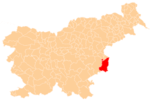Brežice
Brežice (pronounced [ˈbɾèːʒitsɛ] (![]()
Brežice | |
|---|---|
%2C_Bre%C5%BEice.jpg) Main street in Brežice | |
 Brežice Location in Slovenia | |
| Coordinates: 45°54′17.23″N 15°35′32.01″E | |
| Country | |
| Traditional region | Styria |
| Statistical region | Lower Sava |
| Municipality | Brežice |
| Area | |
| • Total | 8.9 km2 (3.4 sq mi) |
| Elevation | 162 m (531 ft) |
| Population (2002) | |
| • Total | 6,856 |
| Climate | Cfb |
| [1] | |
Brežice prides itself on a rich historical and cultural heritage. The Lower Sava Valley Museum (Slovene: Posavski muzej Brežice), housed in Brežice Castle, contains archaeological and ethnological exhibits, exhibits on the Croatian and Slovenian peasant revolt, and a modern history collection. It is one of the largest regional museums in the country. A more recent landmark addition to the town is its water tower, as well as the double arches of the 527 m long iron bridge, which spans the Sava and Krka rivers.
History
Celtic graves from the 2nd century BC have been discovered in Brežice, and it has been continuously settled since prehistoric times. A Slavic settlement called Gradišče was established at the site soon after the arrival of the Slovenes in the area. The castle in Brežice was first mentioned in 1249. The current structure dates to 1529.[5]
Brežice was affected by Ottoman raids several times during the 15th and 16th centuries. Peasant uprisings took place during the 16th century; in 1515 peasants attacked the castle in Brežice, burned it, and killed the nobility sheltering in it. The new castle was able to withstand the peasant uprising of 1573.[5]
The first school was established in Brežice in 1668, taught by Franciscan friars at the friary. From 1774 to 1780 instruction took place at Baron Moscon's residence, and from 1780 to 1820 at the rectory. A separate school building was built in 1875.[5]
A general hospital was established in Brežice in 1872. Its facilities were expanded in 1889.[5]
During the Second World War, Brežice and the adjacent countryside to the north and west were known as the Rann Triangle (German: Ranner Dreieck), an area intended for the resettlement of Gottschee Germans that had been evicted from the Gottschee region in the territory annexed by Italy.[6][7]
Brežice expanded after the Second World War by annexing the neighboring villages of Brezina (German: Bresina),[3] Črnč (Tschernz),[3] Šentlenart (Sankt Leonhard),[3] Trnje (Ternje),[3] and Zakot (Sakot).[3]
Churches
Saint Lawrence's Church in Brežice was first mentioned in written sources in the 12th century. It stood on the bank of the Sava (now an old side channel). It and the adjacent cemetery were heavily damaged by flooding in 1781, which also changed the course of the river, and the current church was built in the town center in 1782. Brežice has been the seat of a parish since 1641. Another church in the town, built in the second half of the 17th century, is dedicated to Saint Roch.[5]
Main Sights
_(3981867866).jpg)
Brežice Castle
Brežice Castle is the dominant feature of the town, standing above the left bank of the Sava. It is now a museum housing several collections and exhibitions. In the castle chapel there is an altar by Luka Mislej.
Water Tower
The Brežice Water Tower is the most prominent structure in the town, and is regarded as its symbol. Built in 1914, it was a key part of the town's water supply system until in was replaced by a new reservoir in 1972, after which it had an auxiliary role until 1983.[8]
Education
Brežice Upper Secondary School
The Brežice Upper Secondary School (Slovene: Gimnazija Brežice) opened in 1945,[5] is built on the site of a Franciscan friary. The school was renovated in 1966, when an extension was also added. 690 students attend the school.[9]
Brežice Faculty of Tourism
The Faculty of Tourism was founded in December 2009[10] and is part of the University of Maribor, Slovenia's second-largest university. It is located in the center of the town on the main street, Cesta prvih borcev. In the 2012–2013 academic year it enrolled the first class of students in two three-year undergraduate programs in tourism: a vocational program and a bachelor's program. The faculty will also offer a master's program in tourism starting in the 2014–2015 academic year.
Notable people
Notable people that were born or lived in Brežice include:
|
|
Gallery
 Brežice
Brežice Brežice
Brežice
References
- Statistical Office of the Republic of Slovenia
- "Slovenski pravopis 2001: Brežice".
- Leksikon občin kraljestev in dežel zastopanih v državnem zboru, vol. 6: Kranjsko. Vienna: C. Kr. Dvorna in Državna Tiskarna. 1906. pp. 6, 10.
- Brežice municipal site
- Savnik, Roman, ed. 1976. Krajevni leksikon Slovenije, vol. 3. Ljubljana: Državna založba Slovenije, pp. 24–27.
- Stieber, Gabriela. 2005. Consolidated Intelligence Reports: Psychological Warfare Branch, Military Government Kärnten, Mai 1945 Bis April 1946: Eine Quellenedition Zur Geschichte Der Britischen Besatzungszeit in Kärnten. Klagenfurt: Verlag des Kärntner Landesarchivs, p. 209.
- Petschauer, Erich. 1980. Das Jahrhundertbuch der Gottscheer. Klagenfurt: Leustik.
- "Brežiški vodovodni stolp je bil zgrajen pred 100 leti" [The Brežice Water Tower was built 100 years ago] (in Slovenian). Radiotelevizija Slovenija. 2014-05-16. Retrieved 2017-05-09.
- "Gimnazija Brežice". www.gimnazija-brezice.si. Retrieved 2015-12-11.
- "About us - Faculty of Tourism". Archived from the original on 2014-05-18. Retrieved 2014-05-18.
External links
| Wikimedia Commons has media related to Brežice. |
